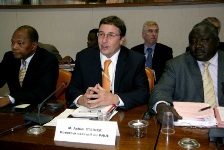UNEP head highights key role of ACP countries in lead up to Rio+20
 Brussels,11 December 2011/UNEP/ACP– During the recent council meeting of African, Caribbean and Pacific state Ministers, UN Under-Secretary-General and UNEP Executive Director Achim Steiner made a special presentation to highlight the important role of ACP countries in the run up to the UN Conference on Sustainable Development Rio+20.
Brussels,11 December 2011/UNEP/ACP– During the recent council meeting of African, Caribbean and Pacific state Ministers, UN Under-Secretary-General and UNEP Executive Director Achim Steiner made a special presentation to highlight the important role of ACP countries in the run up to the UN Conference on Sustainable Development Rio+20.
Having come directly from COP17 in Durban, in his address he linked climate change to the wider issues of sustainable development as part of the broader preparatory process for Rio+20.
Mr Steiner stated that the transition to a green economy, one of the two major Rio+20 themes, will enable ACP countries to “establish partnerships that facilitate delivery on the ground and strengthen South-South Cooperation; mobilize financial resources, foster a country-owned, people-centred policy framework, promote good governance and building human and institutional capacities while reducing social, economic and environmental vulnerabilities.”
Mr Steiner added that: “UNEP is especially well equipped to provide technical assistance in realizing this transition. UNEP has supported all 48 least developed countries through its program of work and via the Brussels Programme of Action adopted by the Third United Nations Conference on Least Developed Countries in 2001. Green economy policy road maps can help countries progress to a resource efficient socially equitable green economy.”
Despite the importance of this bottom up approach Mr Steiner emphasised that “no matter how vigorous and how profound, there needs to be a top at which to aim,” as well as a “level of coherence in our international governance structures to maximize delivery and support.”
Mr Steiner impressed upon ACP ministers the importance of their support in this second strand of the Rio+20 conference, that of the institutional framework for sustainable development.
“The ACP Council of Ministers is in many ways a very special and very forward looking architecture of policy making and governance,” Mr Steiner said. “One that can have a unique role to play in inspiring a world of new, fresh and young geopolitical structures to finally deal with some age old, but increasingly urgent challenges-that in their resolution can establish the kind of future we all want.”
In the lead up to the COP17 conference in Durban, senior officials from ACP member states met in Brussels to share positions on critical climate change issues and developments. ACP members called for the international community to limit the rise of the global averaged surface temperature to no more than 1.5 degrees Celcius above the pre-industrial levels by 2100, and to work to ensure that global greenhouse gas emissions peak by 2015. Members highlighted the need for a binding agreement on emissions reduction for both developed and developing countries, with Annex I Parties to accept enhanced emission reduction targets.
(Pictured: UN Under-Secretary-General and UNEP Executive Director Achim Steiner(center) addresses ACP ministerial council last Friday)
– UNEP/ ACP
